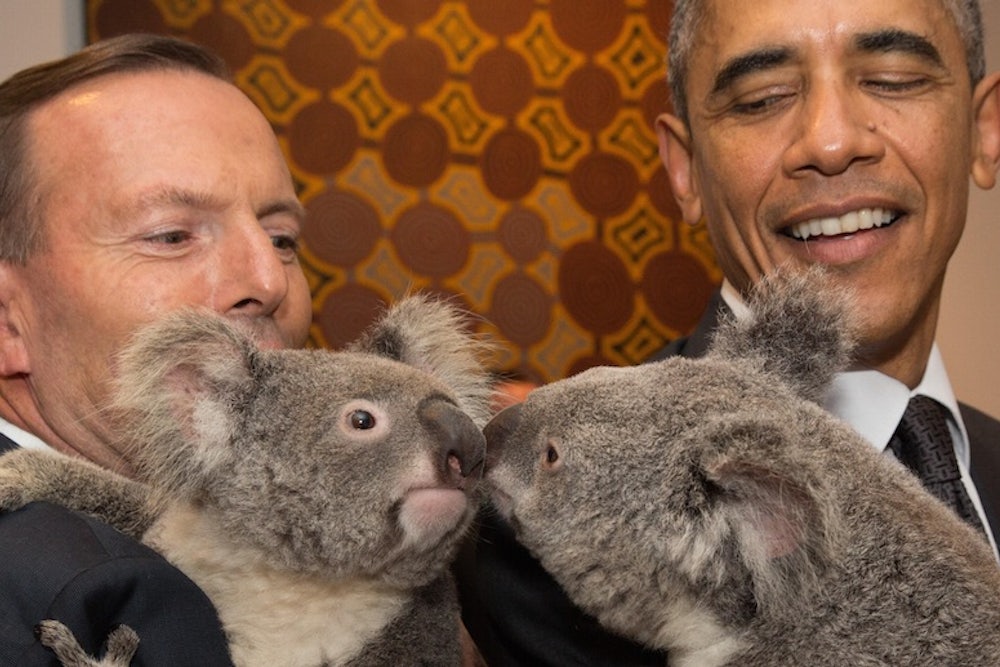Climate change was maybe the last thing Australia Prime Minister Tony Abbott wanted to focus on at this weekend's G-20 summit with the world's largest economies. As the host of the G-20 talks, Abbott wanted to discuss only "economic security" and "private-sector led growth," and refused to include climate change in that conversation in the formal agenda. This was expected behavior for Abbott, a leader with an abysmal record on climate change and who helped repeal Australia's carbon tax.
In the end, he didn't have much of a choice—climate change became a focus in informal and formal discussion. President Barack Obama made sure of that.
At the Brisbane summit on Saturday, Obama addressed Australia's reluctance to tackle this issue head-on. While Australia's emissions are a small fraction of the United States', the two countries are also first and second, respectively, among western nations in carbon pollution per person. In Obama's words, neither have "been the most energy-efficient of nations." Repeating his call from a United Nations summit in September, Obama said "every nation has a responsibility to act." And "whether you are a developed country, a developing country, or somewhere in between—you’ve got to be able to overcome old divides, look squarely at the science, and reach a strong global climate agreement next year." Unlike his speech in September, Obama had a more persuasive case this time, because the U.S. and China just demonstrated it is possible.
Obama also pledged $3 billion to the Green Climate Fund, an international fund that helps poorer countries adapt to global warming. It's another key signal to the world one of the world's biggest polluters is committed to reaching a global agreement on limiting global warming, expected by the end of 2015. And earlier this week, the U.S. and China announced an agreement—negotiated for months in secret—that they will seek to lower greenhouse gas pollution by 2025 and 2030, respectively.
At the last minute, the U.S. and Europe got what they wanted—which was having climate change added to the summit's formal text, including a call for contributions to the Green Climate Fund, which Abbott opposes, and to phase out fossil fuel subsidies. Officials told Reuters that getting there was difficult, given Australian opposition. "This was really trench warfare, this was really step by step by step. In the end we have references to most of the things we wanted," a European Union spokesman said.
This doesn't mean Abbott has any intention to change Australia's position as an outlier on climate change action. In a discussion on energy, Abbott assured leaders he is "standing up for coal." Even so, he faces pressure domestically from Australians who don't share this view. Ahead of the summit, more than 400 protesters buried their heads in the sand in protest of the government’s refusal to address climate change:
Aussies put heads in sand on G20 eve. @TonyAbbottMHR get your head out of the sand on climate: http://t.co/ZPAkS8k3RZ pic.twitter.com/3cgl1UCa5w
— 350Australia (@350Australia) November 13, 2014All this together put Abbott in an awkward position as the host of G-20 leaders. In fact, he faced questions from reporters on Wednesday after Obama and Chinese President Xi Jinping made a surprise agreement on limiting greenhouse gas pollution post-2020. Abbott avoided discussing Australia's long-term goals, only saying that Australia is on track to meet its 2020 goals to cut emissions by 5 percent. Despite Abbott's insistence Australia will meet its 2020 target for greenhouse gasses, the country's emissions are only increasing by the year.
This article has been updated.
